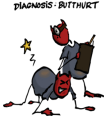The Nostalgia Files is Aubrielle's look at those things from earlier times we consider valuable. Old games, and new games that remind us of old ones, fall under her ruthless - and often rhapsodic - gaze.
Among RPG fans, saying that Baldur's Gate is a classic is probably the most uncontroversial remark you can make. It's like saying that politicans are crooked, or that Nazis are bad. But just how did one game get that way? How did it become what some might call the pinnacle of RPG achievement, and become the grandsire of an entire generation of RPG's?
Come back in time with me for a little while.
* * *
The year is 1998.
Grunge is gone, and something fake has taken its place; empty music plays meaninglessly in insurance offices everywhere. Trashy white guys have taken up rap and they try to mix it with guitars. Pagers are a common sight at every county fair, hanging on the belts of daisy duke shorts and baggy raver pants. They'll be in style for less than a year. Everyone's playing Pokemon and Magic: The Gathering. Those of us without beepers, anyway.
The future of the RPG is uncertain. Diablo lingers in our recent memory, revolutionary and ridiculously fun, but lacking the hard choices and character development of more involved RPG's. The star is waning for the Japanese RPG, even as Final Fantasy Tactics recedes slowly into the past. Hard RPG's remain mostly on consoles - mostly Japanese titles on the Playstation. Suikoden II will arrive this year to much acclaim, but it doesn't please many of the grizzled, dice-chucking Dungeons & Dragons veterans. They need something more. The age of the classic dungeon crawler is long gone, and even AD&D is dying a slow death. What will happen to the Western RPG?
Nobody can imagine that it will be reborn, remade, that December, like some Charles Dickens Christmas miracle. It will be given to us by Bioware, Black Isle, and Interplay, like three Yuletide ghosts telling us our gaming future around a dying fire.
It's Baldur's Gate, and it will reinvent the RPG.
From the moment you bring that big box home, you know it's different. Its only cover art is the symbol of Bhaal etched into a plain brown background. You open the box and there it is, that tall case, those six cd's promising a lengthy install if you're running on a slow computer. But somehow you know it'll be worth it.
Once you start the game, you find that character creation takes forever. This is great - it's just like rolling a D&D character! The dramatic character art is designed to overawe. And the game itself is as bright as childhood daydreams, vivid and colorful. Each character becomes expressive and memorable with the right combination of voice acting and excellent writing. This isn't like the D&D games you remember from way back. This is no slow, methodical dungeon hack, and you can keep your graph paper in the drawer. The isometric view, the sharp graphics, and the cinematic music are something new. Nothing like this has ever happened before.
You'll play it, and you'll replay it. You'll pick up new characters, try different things. Your friends won't stop bugging you about Baldur's Gate, and they'll fight over who gets to borrow it. People around you are wearing out their copies, or losing them by loaning them out. Bioware has created a monster.
The strangest part of all this is the making of the game itself. Now, with the privilege of hindsight, we learn that not only were BG's sales expectations pretty low, but the early game that would eventually morph into Baldur's Gate was initially shot down by a gaming executive. Instead, Baldur's Gate released to massive acclaim, with hungry RPG fans everywhere devouring it like people on the verge of starvation. And really, RPG fans were, in a sense. Baldur's Gate, with its character customization, insertion (you create the protagonist), its revolutionary interface, a series of then-unique design choices, and the use of Dungeons & Dragons and the Forgotten Realms universe, was a vacuum in our lives we never really knew we had.
You could argue that the real success story of Baldur's Gate wasn't the game itself, but the waves of change it brought upon the gaming world. Nothing would ever be the same. Its sequel, Baldur's Gate II: Shadows of Amn, released in 2000 to cacophanous acclaim; it is still one of the most positively-received games ever. You'll find it difficult to find any RPG critic worth their oxygen that claims that BG II didn't change gaming. Dungeons & Dragons was no longer the refuge of the hopelessly awkward high school loser and the smelly old guys. More and more of the public saw just how valuable D&D was in taking you and your friends far away and creating captivating worlds to spend your time in.
And in the gaming world, the message was clear. This thing called the Role Playing Game really was a pursuit people cared about and would spend money on, and it wasn't just for consoles and Japanese designers that worked in the youthful, irreverent anime style. It could be serious, grim, grown up, and very western.
Neverwinter Nights was just around the corner, as was the rise of geek culture. It's certainly no coincidence that a few months after the release of Baldur's Gate II, it was suddenly cool to call yourself a geek and a gamer. Generation Y's first statement to the world as adults was in the form of gamer enthusiasm, in the form of tshirts with 8-bit NES sprites, and a surge in the interest of Dungeons & Dragons as a perfectly socially acceptable hobby. Now the real douchebags were frat boys and stockbrokers and empty-headed socialites. The stigma was gone forever, and the nerds had won.
Rock historians say the opening chords of Nirvana's "Smells Like Teen Spirit" took a decade of Generation X's cultural angst and catapulted it into the mainstream, changing the world forever. I think the same can be said for Baldur's Gate and what it did for Millennials and for gamers of all ages - it was the opening blow against anti-intellectual, nerd-hating culture, and the game that would change the stakes forever for not only developers and the western RPG, but for an entire generation.
The Western RPG has truly come into its own, and it owes its rebirth to Baldur's Gate.
 indeed.
indeed. indeed.
indeed.










































